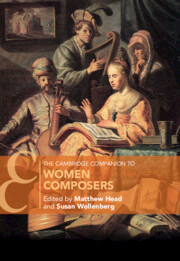Book contents
- The Cambridge Companion to Women Composers
- Cambridge Companions to Music
- The Cambridge Companion to Women Composers
- Copyright page
- Dedication
- Contents
- Figures
- Music Examples
- Contributors
- Acknowledgements
- Abbreviations
- Prologue
- Part I Themes in Studying Women Composers
- Part II Highlighting Women Composers before 1750
- 6 Medieval Women in Composition and Musical Production
- 7 Sixteenth-century women composers, beyond borders
- 8 Women and Composition, circa 1600–1750
- Part III Women Composers circa 1750–1880
- Part IV Women Composers circa 1880–2000
- Bibliography
- Index
- References
6 - Medieval Women in Composition and Musical Production
from Part II - Highlighting Women Composers before 1750
Published online by Cambridge University Press: 23 May 2024
- The Cambridge Companion to Women Composers
- Cambridge Companions to Music
- The Cambridge Companion to Women Composers
- Copyright page
- Dedication
- Contents
- Figures
- Music Examples
- Contributors
- Acknowledgements
- Abbreviations
- Prologue
- Part I Themes in Studying Women Composers
- Part II Highlighting Women Composers before 1750
- 6 Medieval Women in Composition and Musical Production
- 7 Sixteenth-century women composers, beyond borders
- 8 Women and Composition, circa 1600–1750
- Part III Women Composers circa 1750–1880
- Part IV Women Composers circa 1880–2000
- Bibliography
- Index
- References
Summary
Musical composition in the Middle Ages involved many processes far removed from what is understood to constitute the subject in the twenty-first century. Whether one considers men or women in the medieval period, it makes the greatest sense to speak about musical production across a broad spectrum of activities including: singing within communities; teaching and learning music (most often through singing); copying and/or commissioning musical, theoretical, and liturgical texts; setting preexisting pieces with new texts (the most common compositional process in Western Europe); recombining older musical materials in new ways; adapting new music or texts (or both) to preexisting circumstances; and lastly introducing completely new pieces or bits of pieces, usually within the context of preexisting materials.1 Scholars have known for decades that women had agency in all these categories; each of them required musical knowledge and creativity.2
- Type
- Chapter
- Information
- The Cambridge Companion to Women Composers , pp. 95 - 115Publisher: Cambridge University PressPrint publication year: 2024

